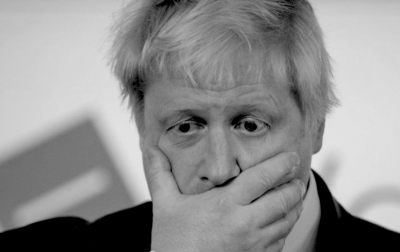Britain on the Brink: Boris Johnson Moved to Intensive Care

UK Prime Minister Boris Johnson was moved to an intensive care unit at St. Thomas’ hospital in London, it was revealed last night. The PM had been suffering from coronavirus and had self-isolated for over a week, before being admitted to hospital on Sunday for ‘tests’ to be carried out. However, it was reported on Monday evening that the decision had been taken to move Johnson into an ICU in order for his care to be more closely monitored. A source has said that he has required oxygen, suggesting breathing difficulties, although a spokesperson said he was moved ‘as a precaution, should he require ventilation’.
The announcement came as rumours began circulating that Johnson’s condition was indeed worse than was being reported. At the daily coronavirus press briefing at 5pm on Monday, Foreign Secretary Dominic Raab said that the PM was in ‘good spirits’ and was still leading the government, but this did not tally with his admission that he hadn’t spoken to Johnson since Saturday. Speculation that something was afoot proved correct when a Downing Street spokesperson released a statement:
“Over the course of this afternoon, the condition of the Prime Minister has worsened and, on the advice of his medical team, he has been moved to the Intensive Care Unit at the hospital.”
The UK has no formal succession plan in the instance that a prime minister becomes incapacitated, indeed it is the first time in history a sitting PM has been admitted to intensive care. Nevertheless, Boris Johnson, aged 55, has asked Foreign Secretary Dominic Raab to deputize for him in the meantime. There must be concern however it is only a matter of time before other ministers in the cabinet start exhibiting symptoms. After all, Johnson must have already been experiencing mild symptoms of the virus as he continued to meet with his cabinet on a daily basis.
Leaders from across the globe – from Trump to Merkel – joined UK politicians from all parties in wishing Johnson a speedy recovery. There could not be more of a symbol of just how serious this virus is, when a country’s leader succumbs to it himself. And yet, to this day there are those espousing theories that governments are exaggerating, that in fact, flu kills as many people as coronavirus each year, and it is simply a way for our governments to enforce authoritarian measures. I hope that as time goes on, people will see just how virulent this disease is and how many people from across the social spectrum are suffering. We can only hope that then such people will begin to rethink these conspiracy theories and be more responsible in their statements.
This pandemic is of historic proportions. There are already 1,240,296 cases worldwide and the death toll sits at over 69,346. Healthcare systems are being swamped by the amount of cases. For all our modern technology, it doesn’t feel as if we are much better placed for fighting Covid-19 than we were for grappling with the Spanish influenza of the early 20th century. It is estimated that it killed between 17 and 50 million people. We can only hope that through social distancing measures now in place in many of the affected countries, that we can somehow slow down the speed of the pandemic. But it’s important we realize that we’re in it for the long haul. We don’t yet have a vaccine for this disease; it could be months and months before social distancing measures can be rolled back. Spanish influenza lasted for 2 years, and even if we manage to ‘flatten the curve’, as it is said, we are in danger of exacerbating the pandemic once again when measures are relaxed.
The economic consequences of this pandemic for the UK are beginning to be felt.
Not only travel and aviation companies are struggling, but retail, which was already suffering due to uncertainty over Brexit. Department store chain Debenhams, a high-street brand which can trace its history as far back as 1778, has now filed for administration.
Other retailers such as Primark have opted to cancel orders with their suppliers in order to try to save their brands. We will no doubt see many more casualties to the virus in the business world. It was reported last week that 6 in 10 UK firms have no more than 3 months of funds left. Indeed as many as one million small businesses across the country could collapse over the next month. Chancellor Rishi Sunak has promised unprecedented levels of government support to businesses, including tax holidays, loan guarantees, and paying 80% of workers wages, but some employers have said this is not enough. It is said that gaps remain in the government’s proposals and that companies need urgent financial aid now, and cannot wait weeks and months.
Uncertain times for Britain lie ahead. With the PM in intensive care, the potential for other ministers and politicians to follow suit, and more coronavirus cases every day, it is clear that this crisis has the potential to escalate even further. And yet, even when the pandemic is over, we may still feel the economic aftershocks for years to come…
*
Note to readers: please click the share buttons above or below. Forward this article to your email lists. Crosspost on your blog site, internet forums. etc.
This article was originally published on InfoBrics.
Johanna Ross is a journalist based in Edinburgh, Scotland.
Featured image is from TruePublica

